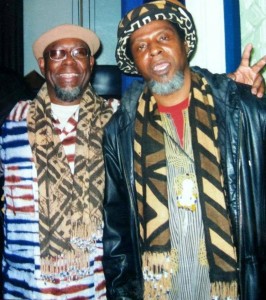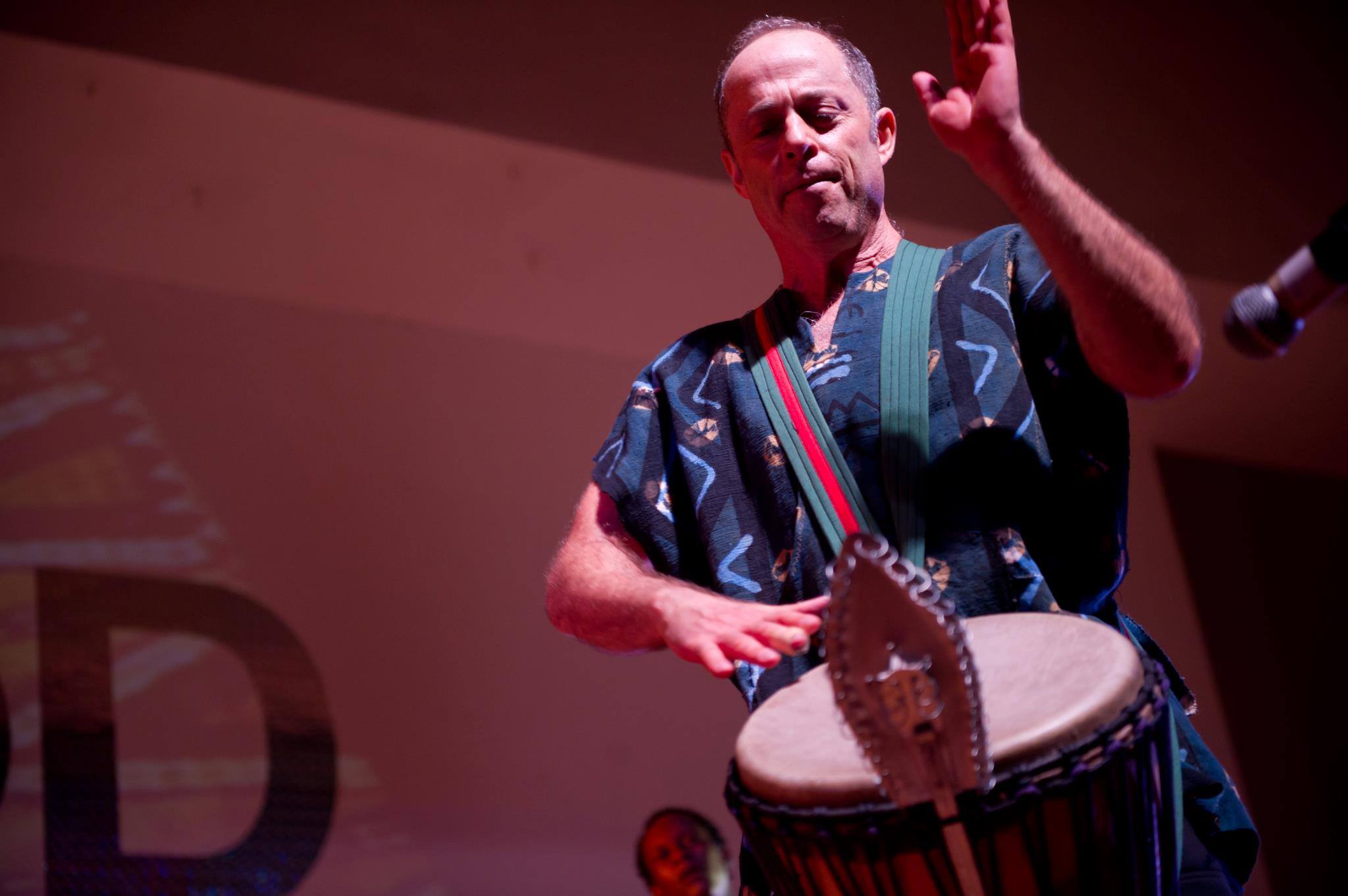I will be back in the USA in April 2019 and starting up new private training sessions as well as group, and Skype on-line lessons on djembe, percussion and playing the conga drum. My specialty is traditional West African drumming from Guinea and Mali featuring the Djembe and Dunun drums. If you play congas or prefer we can also study Afro Cuban drumming .
We like to call it formal training as we practice each of the individual parts and we push ourselves beyond pre conceived limitations. Through the use of slow, patient, step by step instruction and repetition I guarantee almost immediate results. The djembe comes from a long , proud deep tradition and my goal is to pass on the many wonderful lessons I have received and learned in over 40 years of studying with masters abroad as well as in USA.
I am looking forward to working and playing with you all as teaching is my passion in life. I love to share and have great joy when I am able to connect through the drum with you!
I started teaching as a way to help others enjoy drumming more, to share the wonderful aspects of the drum and the deep rooted culture it comes from and also to deepen and further my own learning and understanding and learning. Because when I teach I teach how I would like to be taught, with patience in a step by step manner. I also learn something new in every class I am an instructor in.
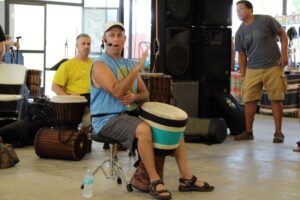
I have developed various and very effective systems for teaching and sharing information and a specific methodology over the last 35 years.
I designed my teaching methodology to make it easy and quick for you to learn and understand the various principles, playing techniques and musicality that is involved in learning these wonderful drums, percussion and drumming styles we will explore.
You do not need any experience in music or drumming to learn to play the drums. All you need is an open mind and willingness. And if you are already drumming and stuck in your practice or not moving ahead I can quickly help you resolve any issues you are having or help you look at any areas of frustration or “stuckness” and help get you to play more freely.
Minimum input maximum output.
Through the use of effective playing technique and training we are able to create great sound with ease and with out stress and suffering. I teach a method of playing drums where our hands “bounce, lift and float” rather then a violent pounding. This helps let the sound be pulled out of the drum rather then forced out. The result is much more ease in the body and longevity as well. Form and fluidity are keys in this process as well.
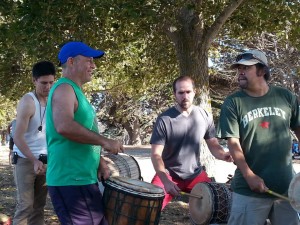
Its all about you!
It is not about me, and not about what I want you to learn. It is all about you and what you need or want.
Yes, I offer various programs and specific styles but they can all be altered to fit your exact needs and wants. I am here as your guide to take you wherever you need to go on the drums.
If you are not in Florida and would still like to study with me I also have Skype and we can arrange for Skype one on one lessons! Skype live one on one on line lessons let you learn in the comfort and convenience of your own home. You can also check out my on line downloadable lessons here on my website by clicking on lessons in the pull down menu.
For Skype lessons all you need is a computer , microphone and of course a drum. Skype lessons are easy and fun to do and highly recommended if you can’t be there in person it’s the next best thing . I will also be offering classes and courses in beautiful Maine in the summer if you can not make it to Florida in April or May.
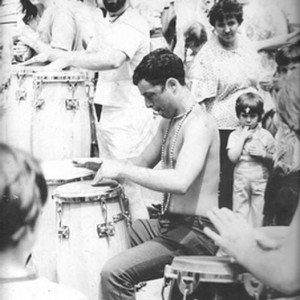
About my classes
If you have ever wanted to learn to play the djembe drum, percussion or congas, or if you already play and would like to improve your skills a group or private class might be perfect for you.
In a group and private class we learn to walk before we run with warm ups, basic hand patterns, and rides leading into speaking, phrasing and learning how to solo.
Learning the language and technique of hand drumming will help you connect to your inner self, to your drum, your friends, other musicians and to the music you play.
Learning traditional and non traditional styles of drumming both increase your vocabulary of rhythms and therefore, gives you more creative power and more creative output and interest level. And developing proper skills, that is to say how to make the different sounds properly and to make the drum speak can also greatly further expand your possibilities musically or for just having fun. After all we are indeed “playing” drums and it should be fun!
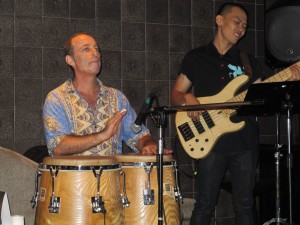
I have been teaching, performing, recording and continually studying all around the globe for over 40 years, this is my life and passion. As you can probably tell, I live for drumming.
It’s important to recognize there are different styles, and types of drumming. Some people want to play at, solo in or lead a drum circle, in a band or just with friends. And some folks want to play in a dance class or traditional setting or drum and dance performance. It’s all good!
No one style is right or wrong and we must accept and appreciate all aspects of drumming and expression. My goal is to help you achieve your full expression of who you are on the drum. No matter what style you would like to play, together we can work on effective and efficient means to get you there and to make your drumming excel.
Please check out this new interview about my life as a percussionist by Les Moncada: http://worldmusiccentral.org/2016/05/01/les-moncada-chats-with-conguero-and-djembefola-drummer-michael-pluznick/
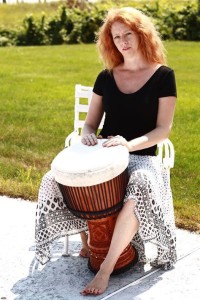
Different ways of learning
There are many different ways of learning and we all lean differently. Some people prefer math and numbers, maybe you like to think about it first and understand it? For some people vocalizing the rhythm or part helps, they like to “say it before they play it”.
Other people are visual and like to see and copy the part first. Some people like to hear and repeat. Whatever method of learning you prefer we can explore together. It’s important to me that are comfortable and able to learn in whatever way best suits you.
Taming the inner critic:
Learning to play any instrument, especially drums starts with a healthy mental attitude and out look. We will work on using a very positive and supportive approach to learning to play percussion instruments. To read more about this approach please read this short article I wrote by clicking on the following link: taming the inner critic and learning to drum
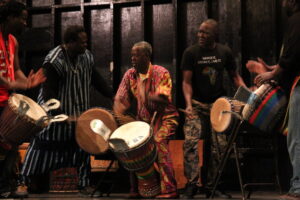
The Djembe Drum
The djembe drum is a musical instrument like any other musical instrument. It is not a toy or something we “bang on”.
The Djembe has techniques and sounds it has been designed to make such as bass, slap, tone, muff and variations there of.
These sounds are used to form rhythms or basic handing patterns which we will learn and play. The patterns repeat like a mantra in meditation. The more you get into them the deeper and better your playing will become because these patterns teach you and give you the groove. Having the groove means you can bring the spirit of the drum out!

We will study how to make and execute these basic sounds and speak on the drum. The djembe has a long, deep and proud history which connects to the people and cultural traditions of west africa.
Before we go forward I find it very helpful to understand where the drum came from. For example, for me it’s always fun and interesting to know the meaning of the rhythm I am learning. What it is used for?
We therefore approach the drum with humility and respect regardless of which style we choose to play or where we take it. The drum does indeed come from a long deep and meaningful history from a proud people in west africa originating form the mandingue.
My history and short Bio
I was introduced to drums as a small child on frequent trips to Puerto Rico in the early 70’s. I knew immediately even as a small child this is what i wanted to do in life. I bugged my father until he got me a tack head conga and later a mexican conga with tuneable hardware.
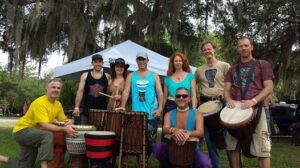
I started playing and studying in the mid 70’s and have lived and studied with masters multiple times in Cuba, Guinea and Mali West Africa, Brazil, Puerto India and Asia. I have had the great fortune and destiny to meet and study with several masters and grand masters as well who have taught me and been patient with me.
Because I love to study people love to show me stuff. I am still learning about the drum and drumming every day, We all have our own rhythms and something to share. I can learn from you and you can learn from me.
Bolokada Conde has been my most recent and effective teacher. I have taken several courses with Mamady Keita as well as several other leading drummers including the late great Kemoko Sano who I lived with in Guinea on my first trip there. I also studied with members of his family and troupe “Ballet Merveille”. I stayed at there compound, waking up to and going to sleep to drumming!
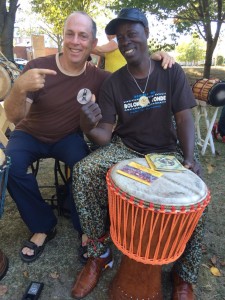
Bolokada is my main teacher and is a Grand master from Guinea. I have also studied with Mohamed Camara, Abdulye Diakate, Karamaba Diabate, Mohamed Diabe, Eric Bli Gore, Dr. Ibro Djobi and grandmaster M’Bemba Bangoura over the years. On my two trips to Mali I studied with the late great Aruna Sidibe, Brulye Doumbia and other teachers,
In Cuba I studied with the great Pello El Afrokan in 1985, Bata with Amado and with Alfredo Calvon and family in 1986 as well as several other great teachers.
In California I was a member of and had the great honour and privilege to perform regularly as one of only two non african djembe soloists in Bolokada’s troupe, Les Percussion Melenke.
I also recorded with Todd Rundgren, Jerry Garcia, Micky Hart, The Tubes and many others in the studio while in the Bay Area and eventually recorded 10 of my own world music and also all percussion CD’s.

I was on three different record labels including the Narada label in the 80’s.
You can hear sound demos of all of my recorded music right here on the is web page by clicking on any of the CD covers at the top of this web page.
In Mali I studied with the late great Aruna Sidibe as well as Brulye Doumbia and Siaka Doumbia.
In the USA I studied with Afro Cuban specialist and Haitian drumming master John Amira in New York, with the legendary and incredible Simbo (Craig Goodman) in California and several other teachers. There are too many teachers to list here but you can check them out in my bio.
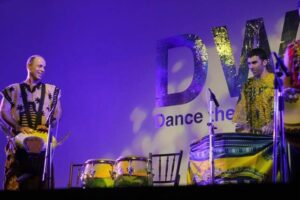
I have performed through out the world and also have taught at major institutions such as Yamaha in Japan and universities across the globe such as USCC and UCS and have also recorded my own music and produced for others projects, CD’s and albums over the years.
Several of my students are now leading facilitators and drum teachers all across the globe, working in various communities of drummers, musicians and non musicians alike. The amazing Arthur Hull was a student as well.
I still consider myself a student and take lessons regularly. Any good player will always continue to study. It is a never ending process and one that I cherish and love. We can all learn from each other and each person has their own innate rhythms they come with. We just need to access this. Taking classes with a qualified teacher helps us to access these rhyhtms.
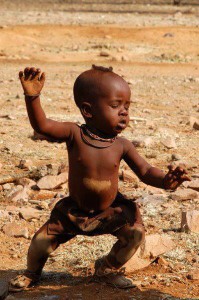
My Philosophy
My belief is that we are all on the path learning and there is always something new to learn. Every time I sit down to play the drum, the drum teaches me something new.
To me this is beautiful and amazing as well. Not only can we learn from each other but the drum can and will teach us as well. You just need to develop the ability to listen and hit the drum malling the correct sounds first.
What is your philosophy?
It’s totally O.K. with me if yours differs from mine and I am very interested to learn about what it is you would like to do or learn on the drums. Its always different and interesting for me to work with new people as we all have different ideas.
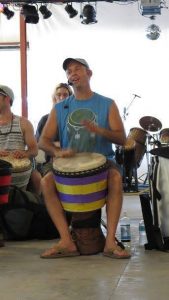 No matter why your philosophy or experience, in my experience I have found that any one can learn to play drums. Patience and small steps can be the key. Step by step.
No matter why your philosophy or experience, in my experience I have found that any one can learn to play drums. Patience and small steps can be the key. Step by step.
Even if you think you can’t, I know you can. It does not matter you age , race, sex or serial number. I have seen it over and over. Often someone will bring come or even another teacher will give me a student and say “they are hopeless”!
I go into the situation open minded and we start off one beat at a time. I have had 100% success rate with them. I am patient and can help you achieve your goals on the drums. We sometimes need to go slow, have patience and start with square one. Slow learners and fast learners are welcome! We will find which teaching method works best for you and have fun doing it as well!
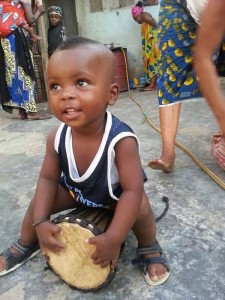
About hand drumming
Drumming is a creative art form and also a very healing tool.
It can help to root you, ground you, balance you and expand your consciousness in many ways you may have not thought possible.
I always feel better after I drum, it helps me move my energy, if I am feeling stuck or sluggish.
For example, I have often gone to a class or session not feeling well and come out afterwards feeling fantastic. The healing powers of the drum is indeed amazing.
Traditional rhythms to me are like alchemic formulas that way back when were originally put together with an intention or purpose such as being played for a harvest festival, for celebration, for rituals or for initiations. These formulas had an intention. A use and a meaning.
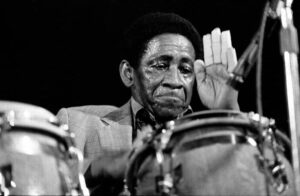
Along with dance, singing, and intention they create a holistic effect in the community.
Bringing people together. The drum, the djembe is about unity. One of my teachers say’s djembe comes from the phrase djembe bara or “unity of the drum” in his language.
Today, most of the rhythms we play are now used for popular purposes and social events .
Menawhile, the djembe drum and djembe drumming is spreading all around the world at an extremely impressive rate. As the djembe drum becomes a household word often associated with drum circles or large groups it’s also important and I would say more important to learn about it’s history and usage in the culture it comes from.
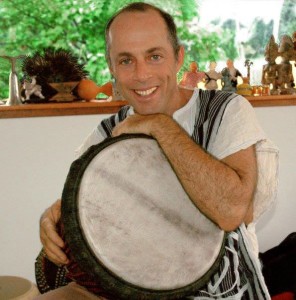
There are new scientific studies coming out all the time explaining how when we learn new rhythms we are burning new pathways into our brains.
I call this re wiring. And almost everyone feels good, healthy and strong after we play together.
We work on dexterity in classes on what I call, “Rhythm Flow”, strong side/weak side balance. This is about developing the ability to feel polyrhythms and flow in playing in order to facilitate expression.
I would like to mention that i have a degree in Holistic healing and have been practicing yoga for most of my adult life. I have developed several (optional) easy to do hand/arm/wrist exercises we can do together before and after class.
When I was younger I also studied martial arts. I like to bring the concepts of these studies into my drumming and into our classes together. Breathing, relaxing and letting go, surrendering is a big part of the learning process for us all.
Whats involved in an intensive 7 day, 3 day or 1 day course?
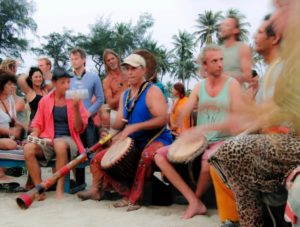
The seven day course is basically about you learning in an accelerated fashion. Each intensive is custom designed and tailor made specifically for you.
By training with me every day we can burn in and effectively get your body and brain to achieve certain things in a very short time that may have other wise taken months or longer to learn.
Simply put it is my personal experience that you can achieve things you may not have been thinking you were able to do before. Because we are working with repetition it is much easier to learn in an intensive then when you take a short class and come back a week later for example. The 3 day course is the same principle as is a one day course for those who can not stay longer. In a one day course we can load you with as much information as your can take in!
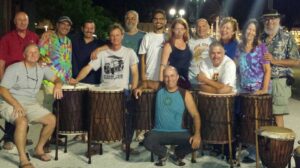
We will have a meeting and discussion first and come up with a full and complete program that fits your needs and will help accelerate your learning process. If you like it can include every aspect of what I teach including warm up, solo techniques, basic fundamentals and many other exercises and fun drumming stuff!
It can combine a variety of styles with anything from afro-cuban and west african to rhythms for bands or how to solo att a drum circle. You can pick and choose and we can also change it as we go along. Nothing is stuck or set.
You don’t need to bring instruments as I have them already. We can also get into the history, the background of the rhythms and take it as far as you would like to go.
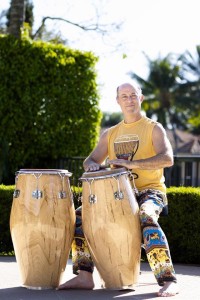
For example, I usually do two sessions, either one hour or one and 1/2 hours at a time every day for 7 days. We can also do up to three sessions per day. We start with warm up and exercises then we get into exactly whatever the person wants to learn or achieve. I allow filming and recording of all classes and encourage it as well as notation. I like to explain and outline what we will be doing and there is always time for question and answer as well.
Please note. Notation is up to you to do, I do not provide it. Having said that we can also learn how to make box notation an effective system to reference classes.
A typical djembe or conga class will have a warm up session and then we learn or review patterns for a specific piece or arrangement. We then will get into call and response exercises to loosen up, have fun and extend our vocabulary.
In the traditional study course we will be going over traditional West African compositions and rhythmic formulas in detail. Each dunun part and each djembe part, one by one. Many of the piece of introduction or unison breaks as well as solo techniques or feels we will also study if the student is ready.
We may then explore a solo technique called “a chain of events”, a group of phrases tied together to tell a story. We may then learn a unison break and or practice exercises to increase speed and technique. We work on posture, how we sit, breathe and hit the drum as well.
If you wear a drum we will go over various positions, techniques and ways to play standing as well as seated positioning. We will also review and correct posture and playing position for seated or standing. Often very slight corrections in positioning and seating can make a huge difference in your playing. We also talk about drum maintenance, tuning and other relevant information if you so desire as well.
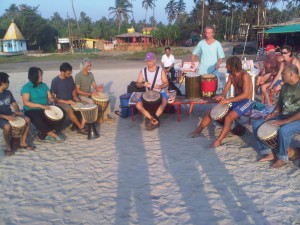
If you are interested and ready to solo on the djembe drum we will discuss the four categories of soloing, traditional or signature phrases for specific pieces, djembe language which crosses into several pieces, western style soloing or fusion/hybrid and last but not least “creative” *(your own).
Some of the exercises we do are things such as working on 3 stroke to 10 stroke rolls put into fun combinations as well as learning how to use rolls, flams, flam rolls, paradidles, and other effective techniques commonly used in soloing.
We will talk about the effective use of space, of tension release, yin and yang and point counterpoint in all aspects of our hand drumming. If you would like to know more about this please drop me a note!
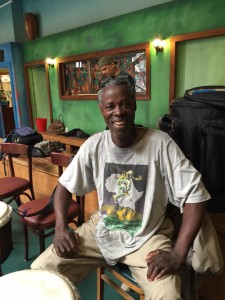
Here is a short excerpt from a 7 day intensive I gave recently to Tara Tucker of Drum Up Big from Tasmania. The classes were on the roof in Bangkok. Please click on the following link: short class excerpt from a 7 day Bangkok drum intensive
Here is an example of “roll techniques” played at speed. Of course we will learn them very slowly, this is just an example of some of the things we will learn and work on in class; Djembe and conga drum roll training sequence #2
Here is another example of a solo chain using traditional phrasing and solo techniques. This is played at speed and we will of course slow it way down to learn in person:
Soko Rhythm Djembe Solo Technique Chain Part 1 Lesson Excerpt by Michael Pluznick
Drum Circle Leadership Program
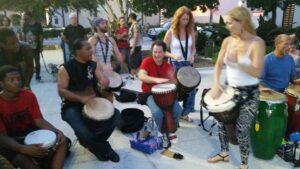
In this course you can learn how to lead, organize, fuel and maintain a community drum circle or drum facilitation program.
We will go over in detail all facets of how to start, play in and facilitate a drum circle. We will also go over every aspect of what you will need to have and do to have a successful drum circle or facilitated program using the “village concept” of community drumming where no one person is more important then anyone else. Every one in the village is equal and a “team”. We must all co operate in order to accomplish our goal of a community sharing experience.
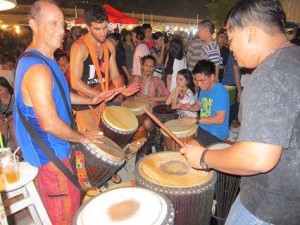
Topics included in this course are ethics, guidelines and of course several rhythm and drum arrangements/ compositions that are easy to introduce and play along with.
A focus is introducing traditional rhythms and basic drum circle style simplistic rhythms to people and groups of people with no rhythmic experience or abilities.
I will also give you several techniques to deal with competitive, ego driven and unreasonable people you may encounter at your event.
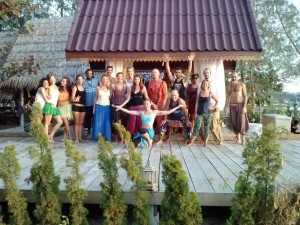
Unfortunately this is the way of the world in the drum circle scenario. So we accept this and embrace this. From the truth we seek and find answers and ways to make it all work together in a harmonious way while leaving the beauty of the free form hybrid drum circle in tact.
We also will explore exercises and techniques to invoke and involve individuals who may not have had any drum experience before. You don’t need any prior experience or musical/ rhythmic abilities to take this course. It is about community, free spirit and embracing chaos. Everyone can drum!
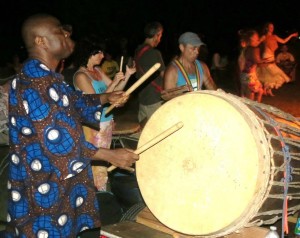
We can also focus on effective and useful solo techniques to play at drum circles. How to be creative under diverse circumstances is a key element in drum circle training.
Anything can happen (and often does) in drum circles so it is important to be ready with the skills needed to handle almost any situation that might arise,
Please check out this video of me using these techniques at the Delray Beach Drum Circle in Florida recently: effective and useful drum circle solo techniques
Price for this course is based on my hourly fee.
Accommodation for the intensives/ workshops
In Florida classes will be at my air conditioned studio in a resort in Loxahatchee Florida 33470. Out door classes are also an option weather permitting.
I recommend Airbnb, please click on their link directly below for more info. Occasionally local friends or students also have rooms for rent. Another inexpensive alternative for short term rentals is crew houses in Fort Lauderdale. I can also help you find places to stay.
Classes in Maine are in Old Orchard Beach. 04064. You can google the many options for either location.
Airbnb – Official Site – Worldwide Accommodations Leader.
Congas
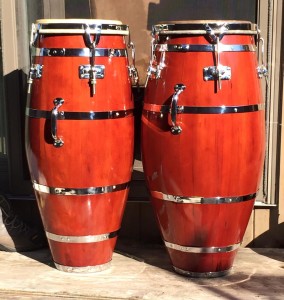
My first percussion instrument was the conga drum also known and “tambore” and tumbador and timba.
I offer several different approaches to conga drumming, both traditional, rumba and modern multiple drum rhythm patterns as well as playing congas for band or even in drum circles if you desire.
I have studied with master conga drummers in Cuba, New York, Miami and California over the last 40 years..
In the traditional rumba school we learn one part on one drum and sometimes two drum or three drum rhythm patterns. We focus on the clave principle, that everything revolves around this simple pattern.
Please check out my Youtube video “Top 40” to see the many different two drum patterns we can explore.

Depending on your skill level we can also explore playing multiple drums in a non traditional fusion style. If you like to play with others this is ideal as well as for bands or amply with music you enjoy or friends.
I also teach several variations of “La Mano Secreta”, the very popular hand technique focusing on the left hand shuffle. I teach this technique in a series with four ,5, 6 and 7 stoke rolls and also will show you how to adapt it and use it effectively in “tumbao” the basic rhythm played in most latin/salsa bands.
Please click on this link to see and listen to my “top fourty ” conga rhythms on 2 conga drums;
40 Conga Rhythms On 2 Drums in a 6 minute Lesson Excerpt

Prices
The cost for a one week course, 3 classes with a total of 4 1/2 hrs per day is $950.
Private lessons are $50 per hour, Skype $50 per hour
My on going drop in group classes in Delray Beach, Florida are $20 per class. Right now there are no group classes however, you can bring your group to my place as an option and we can create a special day or retreat for you.
A 3 day intensive is $450.
A 1 day 4hr intensive is $175.
All intensives are split in half with an hour lunch break or rest in between. Additional classes can be added to any program at a cost of $50 per hour. If you would like each session to be longer or shorter we can adjust it accordingly and make a custom program for you.
The student is responsible for their own transportation, housing, food, water, etc., etc. I offer drums to use on a first come first serve basis.
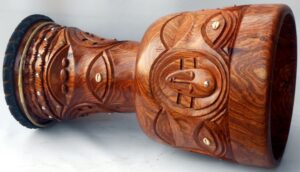
Drums For Sale
I often have l high end professional level djembe drums for sale at all times as well as pro cases. These are often my personal drums, I buy them to play and if someone wants one I often sell them, then get more. Let me know prior to coming.
All of my drums for sale are professional top of the line and of the absolute highest quality and production standards carved by individual artisans. You can e-mail me for photo and/or video links to each drum as well. I also have used drums for sale. You can check out a variety of djembes by my good friends at wula drum. Please click on the link: 4 Pro Djembes For Sale In Southern Florida, USA. Sound Demo …
The Shekere

The Shekere (Sekere/Chekere) is a beaded ghourd. Our style evolves from Nigeria and Cuba respectively.
We can learn traditional patterns used with Cuban music such as at a “guiro” and with what is commonly known as bembe 6/8 rhythms.
There are also very fun non traditional patterns and arrangements on the Shekere as well. If you have your own Shekere we can also go through Shkere gymnastics, throwing and tossing the shekere and how to move and dance with the instrument for performing or just having fun. You must have your own Shekere for these classes.
Bongo
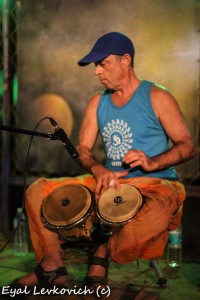
Bongo is one of my favourite instruments. In its popular latin traditional band application the bongo is used as a solo instrument that holds certain specific patterns such as the martillo and “riffs” or plays solo phrases as accents to the music happening at specific points in the song.
There are other styles of bongo playing we can explore from Cuban music. The bongo originated out of Son music. We can also look at how it his used in Changüí. I also enjoy adapting non traditional patterns to the bongo as well.
Simbo, one of my first teachers taught me that whatever you play on congas you can also play on bongo.
Although this is not a traditional concept per se it does work very well and the bongos are a very nice and practical instrument to learn because you have two heads to play so you can play any two drum conga pattern on them. They can played on a stand, seated and even with sticks if you so desire.

They are excellent for traveling (light weight/small) and also for playing in with bands or perhaps an acoustic guitar player.
You can also put them on a stand and play them simultaneously while you play congas, another style that I teach and is very useful for popular music styles.
Combining bongos into your percussion arsenal is useful and practical as well.
The Dounoun (A.K.A. Djun Djun/ Jun Jun /Duns)
The dounoun are the heart, bass and melody of the traditional west african based djembe orchestra in most places in West Africa especially Mali and Guinea. Most commonly played in a set of 2 or 3 drums.
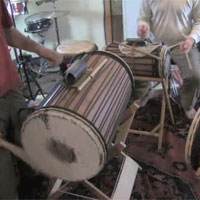
Traditionally they are played sideways one drum at a time with the dominant hand playing a stick to the drum head and the other hand playing a bell. In the modern or ballet style we play 2 or more drums standing up right.
The Ballet style allows one player to play all of the parts simultaneously if there is only one player. Any good djembe player is also a good dounoun player as you can not be one with out knowing the other.
Miscellaneous Percussion
You can play percussion, rhythm and beats on anything! We can explore using cowbells, sticks, bells, blocks and bell arrangement pieces as well as a wide variety of other items and instruments to cease musical dexterity and fun!

You can check out my free lessons at Youtube, just do a search for : michaelpluznick
I have also included several links to some of my videos at the bottom of this page.
If you would like to have more fun on a drum please contact me here or on Facebook by private message. Hope to be drumming with you soon!
www.michaelpluznick.com
Michaelpluznick@gmail.com
Maine Classes now forming!
Everyone is welcome to join this class as it is a mixed level class. I give interesting information to everyone. And challenging parts to those that are advanced. Beginners are attended to as well. We cover much ground including warm up rhythms, call and response exercises, rhythm dexterity training, traditional and no traditional styles of drumming, hand patterns, how to solo and much, much more!
Please write me for more details Michaelpluznick@gmail.com
All levels welcome, especially beginners.
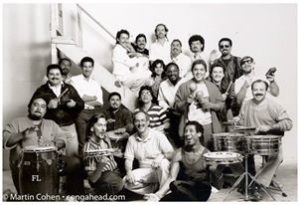
An in-depth look into traditional rhythm patterns, how they connect and feeling the groove.
We will be learning and playing a variety of traditional based west african djembe and dunun parts and seeing, feeling and learning how to integrate them into our bodies and minds.
Intermediate/advanced djembe/drumming class focusing on the use of unison breaks, solo chains and techniques and speaking on the drum. Exercises and dialoging on the drum.
Afro Cuban group classes are forming now as well. Let me know your desired dates and times.
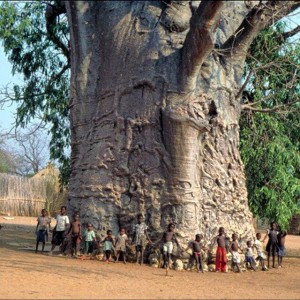
Pieces to explore
Below is a list of West African pieces, Drum Circle and Fusion pieces and Afro Cuban/ Conga Drum pieces I frequently use, but we are to limited to.
For West African we can learn dunun (aka “djun djun”) traditional or ballet style (multiple drums standing up) as well as individual hand patterns and traditional and non traditional (ballet style) solo techniques for each rhythm arrangement . For Afro Cuban and conga rhythms we can use multiple drums or single drums (traditional style) as well.
Please feel free to drop me a note if there is something else you would like to study or learn. This can include techniques, exercises, patterns or rhythms. This list directly below is my most popular pieces but there are many other pieces we can explore as well if there is something particular you would like to learn.
Also, please check out the links highlighted at the bottom of this page. Simply click on them and you can watch the video pertaining to the description in the link.
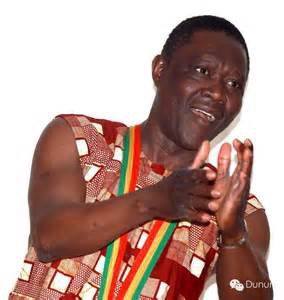
Guinea:
Kuku
Djagbe
Sankaran djagbe
Sankaran balankulanjan
Kassa family of rhythms *(several different variations)
Kakilambe
Yankadi/ Makru
Dununba family of rhythms
Soli rapide
Mendiani
Mamayan
Sohko
Sohko La Ban
Djaa 1 and Djaa 2
Soresonere
Sinte
Sankaran Sogonikum
Kordejuga
Konkoba

From Mali
Marakadon
Tanni/Tansole
Sogonikun
N’Gris
Madan
Diansa
Didadee
Kita Soli
Sunu
Kaarta Sunu
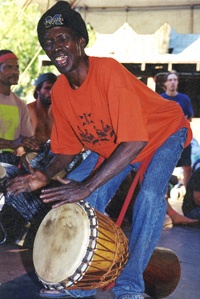
From Senegal
Lamban
Kakilambe
Lingin
Wolosodon/Djon Don
Donba
Aconcon (Econcon)
Drum Circle Rhyhtms /Olatunji/ Simbo Pieces
Frekoba
Camberto
Shiko
Bin Tin
JuJu
Tikili Bell Piece
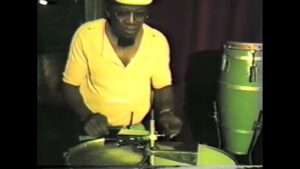
From Cuba
Tumbao
Yambu
Guaguanco
Columbia
Comparsa
Bembe 4/4
Bemb 6/8
Conga Santiago
Abakwa
Pillon
Timba
Songo
Mozambique
Guarapachanguero
Bota
Cha Cha Lek Bafun adaptation
Rumba Obatala adaptation

Other conga pieces
Calypso
Funk/Pop/ rock
Jazz beats/swing
Afro Beat
Raggae Beats
Samba patterns
Haitian
Congolese
Kpan Logo
Links:
40 Conga Rhythms On 2 Drums in a 6 minute Lesson Excerpt
Djembe Crash Course, Part 1 with Michael Pluznick…
VERY NICE! “How to play} shekere class demo and techniques …
Bongo Comparison: 5 Bongo Drums Played & Tested back to …
A Kuku dunun arrangement mini lesson on 3 dunun…

